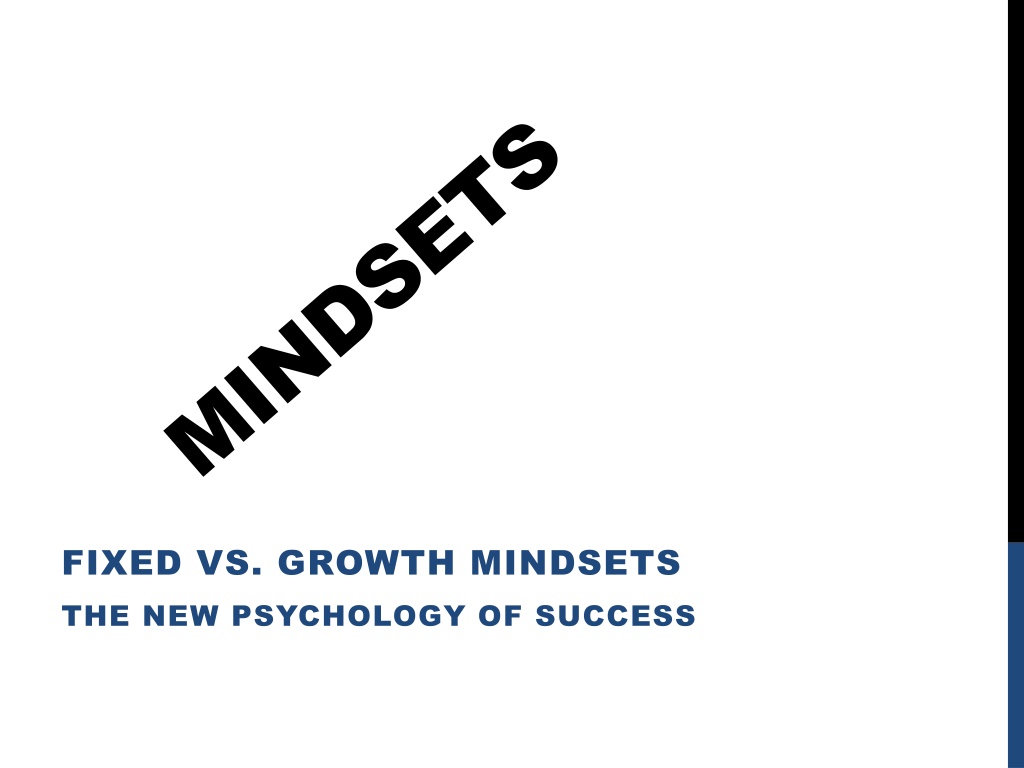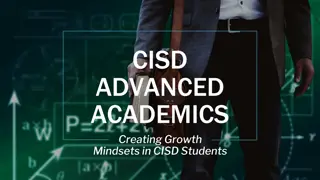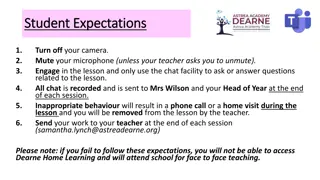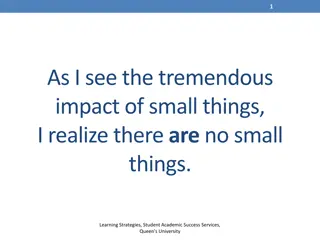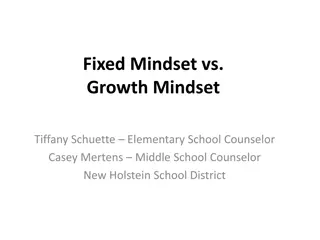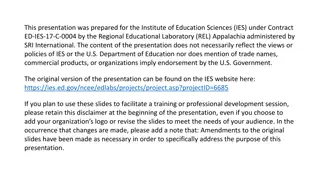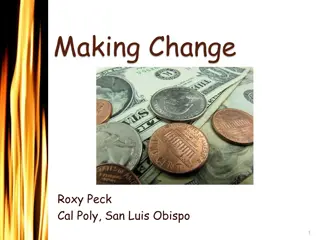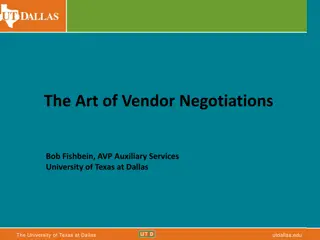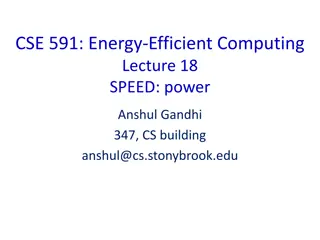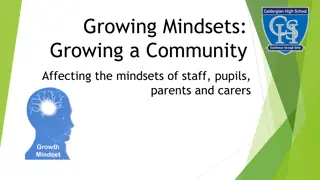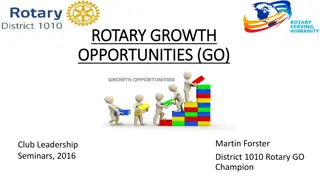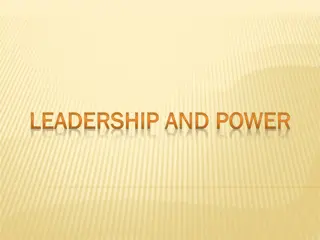Understanding the Power of Mindsets in Success
Explore the concepts of fixed vs. growth mindsets through images and text, highlighting the importance of mindset in determining one's response to failure, success, and intelligence. Learn from a special education teacher about the impact of mindset on student interactions, and reflect on personal beliefs regarding intelligence, hard work, and comparison to others.
Uploaded on Oct 10, 2024 | 0 Views
Download Presentation

Please find below an Image/Link to download the presentation.
The content on the website is provided AS IS for your information and personal use only. It may not be sold, licensed, or shared on other websites without obtaining consent from the author. Download presentation by click this link. If you encounter any issues during the download, it is possible that the publisher has removed the file from their server.
E N D
Presentation Transcript
FIXED VS. GROWTH MINDSETS THE NEW PSYCHOLOGY OF SUCCESS
ABOUT ME Howard County Schools Special Education Teacher Home and Hospital Teacher Academic Intervention Coordinator Teacher Academy of Maryland Teacher Career and Technology Education Teacher
THE RESEARCH OF MINDSET Carol S. Dweck, Ph.D.
WHY DO SOME PEOPLE FOLD UNDER PERCEIVED FAILURE WHEN OTHERS VIEW FAILURE AS AN OPPORTUNITY? OR THIS DO YOU LOOK LIKE THIS AFTER FAILING A TEST?
WHAT HAPPENED??? FROM THIS TO THIS
HAVE YOU EVER SEEN AN UNMOTIVATED BABY?
THIS IS A MOTIVATED BABY!
WHAT IS A MINDSET? A mental attitude that determines how you will interpret and respond to situations. WHY IS MINDSET IMPORTANT? The difference between success and failure is as simple as having a different perspective on intelligence. WHY SHOULD EDUCATORS UNDERSTAND MINDSET? Your daily interactions with your students influence and change a student s mindset.
WHAT DO YOU BELIEVE? Sort the following statements into two groups, true or false, as they apply to your personal beliefs. *Read the following statements and determine if they are true or false according to your personal beliefs.
I BELIEVE Hard work is how you become successful. You can t really change how intelligent you are. I compare my score to those of my friends and if theirs are higher, I feel bad. I haven t mastered this idea yet. You can actually get more intelligent over time. If you have to work hard, you are not very smart.
YOUR MINDSET GROWTH MINDSET Hard work is how you become successful. FIXED MINDSET You can t really change how intelligent you are. I compare my score to those of my friends and if theirs are higher, I feel bad. If you have to work hard, you are not very smart. If someone criticizes me, it means that they think I am not good enough. Some people are just born smart. It s best to do the things you know you know how to do. I m always being judged and evaluated and I have to appear smart. I haven t mastered this idea yet. You can actually get more intelligent over time. When you make a mistake, it means that you have the chance to learn something new. When someone criticizes me, it means that they think I can do better. Intelligence may be partly inherited, but it is also strongly influenced by environment. It s best to take risks even if you re not sure you can do it. I m always finding opportunities to learn something new. I like to hear about other people s successes, because this inspires me.
FIXED MINDSET The individual believes that they are born with a predetermined amount of intelligence that is unchangeable. This person internalizes that without innate ability, or talent, they will not be successful no matter how hard they try.
GROWTH MINDSET Growth mindset people believe they have the potential to learn new skills and accept that through practice and effort, they can increase their intelligence and confidence will follow. This person is willing to take risks and look forward to meeting the next challenge.
YOUR MINDSET AND THE PSYCHOLOGY OF SUCCESS https://www.youtube.com/watch?v=-_oqghnxBmY Growth Mindset Animation Cameron Lisney
HOW WE DEVELOP MINDSET Cultural Influences Gender Micromessaging Life Experiences Peers Attribution Stereotype threat and self efficacy Negative self talk
CHECK THIS OUT https://www.youtube.com/watch?v=NWv1VdDeoRY Carol Dweck - A Study on Praise and Mindsets Trevor Ragan
CAPSTONE PRESENTATION PROBLEM: In predominately female classroom, only two of my forty two students plan to teach secondary education, and only one is planning to teach math. I have also found that while many of my students tend to enroll in liberal arts courses and shy away from advanced mathematics and science courses, as well as AP courses.
CAPSTONE QUESTION Will teaching a unit on growth versus fixed mindset change students perceptions about their ability to take STEM/ AP courses, and/or pursue teaching at the secondary level?
METHODOLOGY 5 DAY LESSON Create a five day unit lesson on fixed verses growth mindset. 1. Students will begin the unit by taking a fixed verses growth mindset quiz, and analyzing their results. 2. Students will research how the brain learns. -Are humans capable of increasing their own intelligence? 3. Is our success is directly influenced by our mindset? -Research on personal and environmental micro messaging and expectations in relation to individual student success. 4. Activity day- Game stations created to recognize activities that develop a growth mindset.
IN ADDITION TO THE PLAN 1. I will combine the class time with guest speakers who are popular secondary and college level teachers 2. I will provide STEM and self-interest surveys to help my students identify themselves as a learner. 3. Reflection time.
DATA COLLECTION TAM Students: I will record the number of AP/ STEM classes that they enrolled in for next year versus what they took last year.
STUDENTS ENROLLED AP/STEM COURSES: 400 350 300 250 200 150 100 50 0 My students Female school Entire School Before Intervention 2013/2014 After Intervention 2014/2015 My Students 13 /30% 24/57% Female Students 121 186 Male & Female 284 381 2014 2015
HOW CAN I PROMOTE A GROWTH MINDSET?
NEVER UNDERESTIMATE YOUR INFLUENCE 3RDGRADE WITH MS. SIMON EXPERIENCE IN SPECIAL EDUCATION He who has NOT said: This kid is not capable of doing the work. STAND UP
NEUROPLASTICITY OF THE BRAIN The ability of the brain to change, adapt, and rewire itself throughout our entire life. Example: Stroke victim. Teaching the potential of the brain to our students is essential when attempting to shift mindsets. Check It Out: https://www.youtube.com/watch?v=ElVUqv0v1EE
SUCCESSFUL RESEARCH BASED STRATEGIES TO USE IN THE CLASSROOM. 1. Acknowledge how hard your students have worked rather that how smart they are for getting it right. 2. Teach students that failure, when treated like a temporary setback, leads to greater productivity. Failure is an opportunity to improve upon and develop skills. 3.Opportunities are invitations to grow. 4. Share your own struggles. 5. Consider giving credit for correcting errors on assignments and tests. 6. Praise risk taking, particularly when failure may be the outcome. 7. Be a role model. Step outside of your comfort zone.
BUILD A GROWTH MINDSET INTO YOUR SCHOOL CULTURE Teach what you have learned today. Practice what you have learned today. Reflect on the micromessages that you send to your students.
PLASTICITY OF THE HUMAN BRAIN https://www.youtube.com/watch?v=MFzDaBzBlL0
CHECK THIS OUT https://www.youtube.com/watch?v=pN34FNbOKXc The Power of belief -- mindset and success | Eduardo Briceno | TEDxManhattanBeach 5:30-7:55
THANK YOU FOR ALLOWING ME TO SHARE WITH YOU TODAY! I would be happy to share more information in the future about: Mindsets Micromessaging STEM Surveys Gender Bias Contact Information: kimberly_burke@hcpss.org Phone: 443-546-7297
RESOURCES http://www.mindsetonline.com/ Hodgson Technical High School, St. Louis, Mo. www.inspiringlearners.com Attitudes Towards Mathematics Inventory, Martha Tapia 1996 A Scientific Attitude Inventory, Moore and Foy (1997) STEM Semantics Survey, G. Knezek & R. Christensen 4/2008
